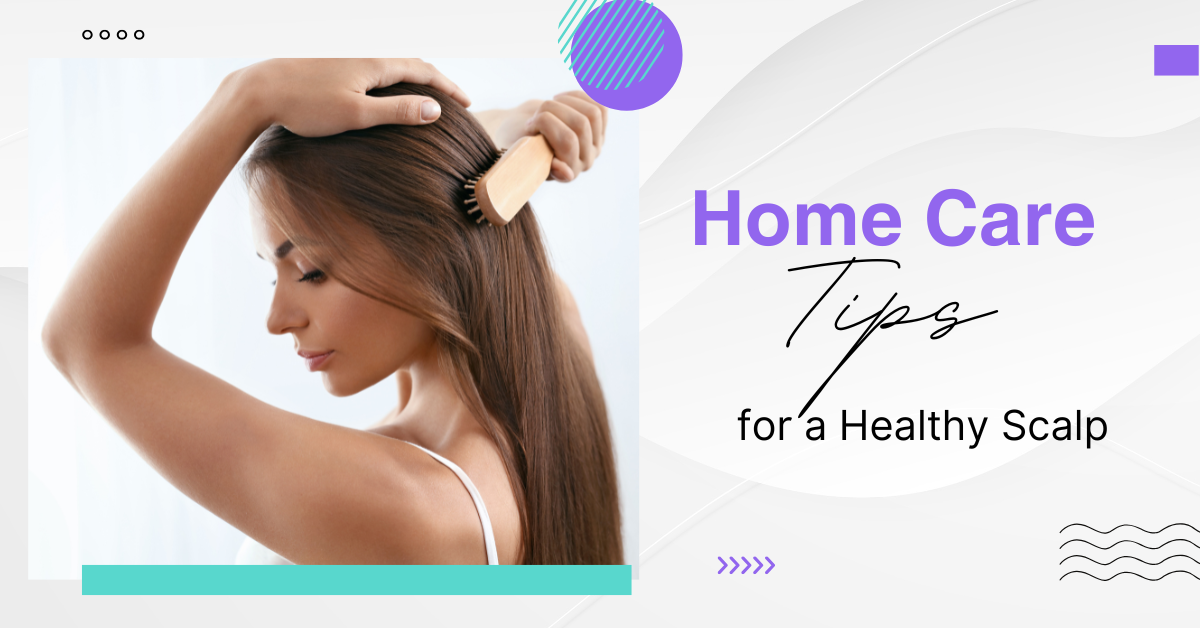It is from the scalp that healthy hair roots, yet most frequent treatments, are neglected. Like the soil of a garden, if it isn’t nourished, the plants (or your hair) cannot thrive. Whether you want a dry scalp, oily, or have dandruff, just want to keep a normal scalp; these home care tips could give your scalp all that self-love.
1. Know Your Scalp Type
Just like your skin, your scalp has a specific type-oily, dry, sensitive, or balanced. Knowing the type of scalp is the first step in establishing proper care for your scalp.
- Oily Scalp: You probably have an oily scalp if your hair gets greasy quickly.
- Dry Scalp: The most common signs for this include flakiness, itchiness, and a tight feeling.
- Sensitive Scalp: Redness, irritation, or discomfort after using certain products.
- Balanced Scalp: No major issues — and therefore just keep doing what you’re doing!
Now that you have identified your scalp type, you will be able to customise your care routine according to its needs.
2. Wash Hair but Not Too Much
Overwashing or under-washing, both are harmful. Washing too often strips scalp natural oils and maintains dryness, and on the other hand, washing not enough leads to build-up and clogging up pores.
- For Oily Scalps: wash every 2–3 days using a gentle, clarifying shampoo.
- For Dry Scalps: Limit washing to 2–3 times a week and use a moisturising shampoo.
- For Sensitive Scalps: Use sulphate-free, fragrance-free shampoos to avoid irritation.
Pro Tip: Always rinse with lukewarm water-hot water acts on your scalp, stripping moisture.
3. Scalp Exfoliation
Yes, exfoliation is sometimes needed for your scalp, too-loving skin cells, product buildup, and too much sebum can clog the hair follicles so that they will get issues, like dandruff or thinning hair, to develop.
- Use scalp scrubs or DIY mix such as brown sugar and coconut oil once in a week to very gently exfoliate.
- Massage scrub into your scalp with circles to promote circulation and reduce buildup.
Bonus: Moreover, scalp massages not only feel great, but it also increases hair growth purposes by enhancing blood circulation.
4. Moisturising and Hydrating
It leads to an itchy and flaky state of the scalp. To keep it hydrated:
- Use a light, non-oily scalp serum or oil (like jojoba oil, argan oil, or tea tree oil).
- Apply aloe vera gel to cool and moisturise it.
- Drink more water because hydration happens from the inside. For oily scalps, use lightweight products that are free from pores clogging ingredients.
5. Natural Treatment for Dandruff
Dandruff can be a real pain; however, here is how you can get rid of it with natural remedies.
- Apple Cider Vinegar: Mix equal parts water and ACV; apply to scalp, wash off later, after 15 minutes of application. Antibacterial properties can help balance your scalp’s pH.
- Tea Tree Oil: Add a few drops to your shampoo for its antifungal and antibacterial benefits.
- Baking Soda: Very lightly scrub the scalp with a paste of baking powder and water.
If the dandruff still exists, a dermatologist consults since it may be a sign of a certain condition, for instance, seborrheic dermatitis.
6. Be careful with Chemicals
Most hair products, such as hairsprays, gels, and mousses, contain sulphates and parabens, along with synthetic fragrances, for scalp irritation. Whenever possible, use natural or organic products.
- Look for “sulphate-free,” “paraben-free,” and “hypoallergenic.”
- Patch-test new products to ensure they do not lead to irritation.
7. Protective Scalp from Elements
Your scalp is no less exposed to sun damage than your skin.
- A hat or a UV protectant spray should cover the scalp while outdoor activity.
- Use a humidifier to limit dryness in winter and avoid heat styling.
8. Diet for a Scalp Healthy
What goes into the mouth reflects on the scalp-healthiness. These nutrients should advocate incorporation into the diet:
- Omega-3 Fatty Acids: Keep inflammatory processes under control and in a hydrated scalp, found in salmon, walnuts, and flaxseeds.
- Vitamins A and C: Those promote, respectively, the production of sebum and the stimulation of collagen growth. Carrots, sweet potatoes and citrus fruits.
- Zinc: Healthy scalp and prevention of dandruff-about which nuts, seeds and whole grains are sources.
9. Stress Management
Stress has powers to damage most parts of your body, with your scalp not being an exception. For example, constipation and hair loss would follow as stress builds up, so you can practice some stress management techniques, like yoga, meditation, and deep breathing, to set your scalp and mind at rest.
10. Feedback from Your Scalp
To a considerable extent, your scalp will tell you whether something is amiss. A close observation of persistent itching, redness, or hair loss should pose a call to the dermatologist. While it is easy now to enter a doctor’s office, more serious consequences can come to fruition without timely intervention.
Final Thoughts
Caring for your scalp need not be complicated. With only a bit of attention and the right routine, you can keep the scalp healthy to make for strong, shiny hair. Remember, a happy scalp equals happy hair, so love it with the care it deserves.








 +61 406 888 546
+61 406 888 546 admin@cosmedhairskin.com.au
admin@cosmedhairskin.com.au Gold Coast: 3019/27 Garden Street Southport, QLD 4215
Gold Coast: 3019/27 Garden Street Southport, QLD 4215